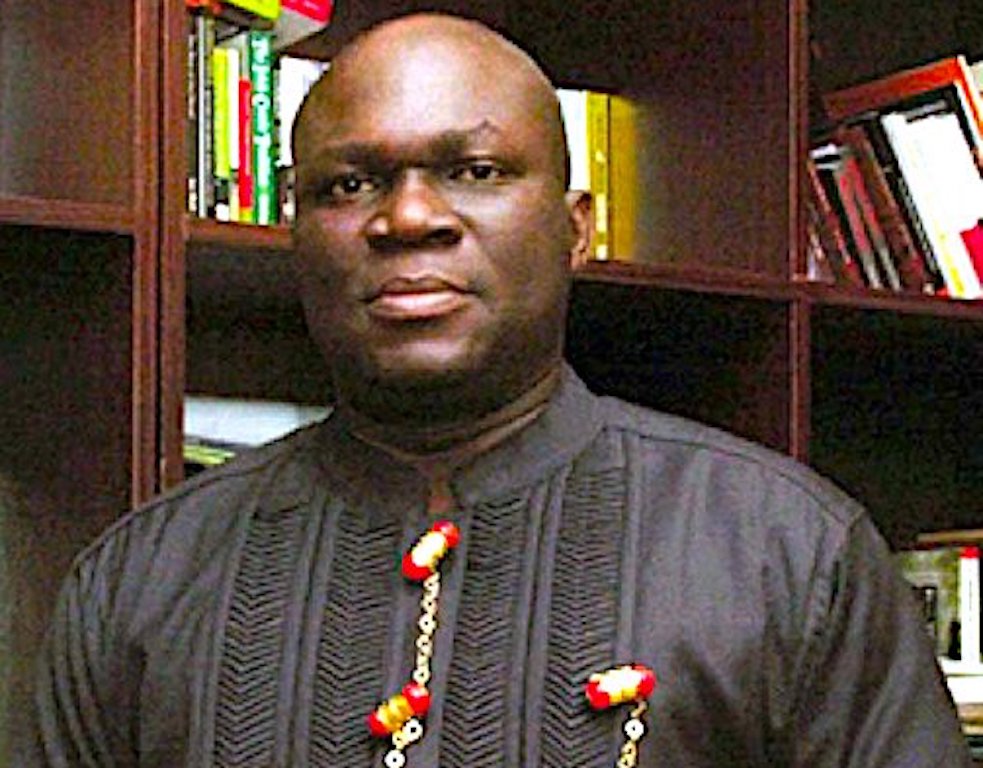Interim Government: A Call for Anarchy, By Reuben Abati

Yesterday morning during Arise News' flagship program - "The Morning Show" - I particularly noticed during the press review with Emmanuel Efeni and the segment called "What's Trending" with Ojy Okpe, from ThisDay newspaper editorial titled: "Interim Government: Perish The Thought". I said that having served as Chairman of the Editorial Board of a major Nigerian newspaper for 11 years, before moving on to other engagements in the public sphere, I am aware that when a newspaper publishes its front-page editorial , as ThisDay did yesterday, it is like yelling, yelling, yelling, calling for urgent attention and signaling that the topic being talked about is the most important. Usually, a newspaper's opinion is scheduled for the editorial pages, but when it makes it to the front page, it means that the newspaper's board considers it a high priority issue. I argued that the newspaper acted correctly in putting this particular editorial in its window. I also agreed with all of the newspaper's submissions. The purpose of this article is to expand the topic further and expand on some of the points that may not have been fully fleshed out in limited editorial space.
ThisDay linked its op-ed to All Progressives Congress (APC) presidential candidate Asiwaju Bola Ahmed Tinubu's statement last week to Ekiti, according to which there is a secret are planning to overturn the 2023 general election so that a caretaker government can be imposed in Nigeria. The newspaper wisely writes: "Although Tinubu did not mention any names or explain how this scheme would work, coming from the candidate of the ruling party in the center, such a weighty allegation is enough to put us on guard against any attempt to frustrate the presidential election scheduled for February 25. Whatever the idea behind the idea of a caretaker government, we must remind them that in today's Nigeria, no one can take power by the back door or by trying to impose its will on the collective.The newspaper added that (1)any attempt to short-circuit the electoral process is unacceptable; (2) that three weeks before the elections, the idea of forming an interim government is a diversion and dangerous; (3) that the idea is unknown in the 1999 Constitution and that the army cannot be co-opted to support such illegality; ( 4) that there is no mortal threat to the elections General of 2023, where there are challenges, these challenges must be met by the State because it is its duty to do so by tackling the current double challenge of the shortage of cash and fuel and finally (5) the federal government must support the electoral arbiter, INEC, with logistics, including security arrangements, while the president must stand firm and protect our democracy. The paper concludes: “Let all who care about power use the platform of electoral politics and let us all have faith in the capacity for self-correction inherent in the democratic order. I can't agree more. The editorial is timely and quite piquant. It is worthy of attention and further elaboration.
The idea of an Interim National Government was a contraption introduced into the grammar of Nigerian politics and governance by the military administration headed by General Ibrahim Babangida when in August 1993, after spoiling the June 1993 general election, Babangida decided to "step down" (in retrospect, whatever that means) and opted to cede power to an interim government led by Chief Ernest Adegunle Shonekan. The interim government lasted from August 27, 1993, when it was formed, to November 17, 1993, less than 90 days, when it was dissolved by General Sani Abacha, left by Babangida as Secretary of Defense, and who believed that becoming Nigeria's head of state was his turn, not Shonekan's. This "Emilokan" thing didn't start yesterday in Nigerian politics. Shonekan was a lawyer and a prominent technocrat who rose to head the United African Company (UAC) in Nigeria. It was the product of an agreement reached with the British and other stakeholders. It all ended in tears. During the 88 days that the ING was in power, the country drifted. Strikes by unionized workers. High inflation. The media refused to cooperate. The South We...


Yesterday morning during Arise News' flagship program - "The Morning Show" - I particularly noticed during the press review with Emmanuel Efeni and the segment called "What's Trending" with Ojy Okpe, from ThisDay newspaper editorial titled: "Interim Government: Perish The Thought". I said that having served as Chairman of the Editorial Board of a major Nigerian newspaper for 11 years, before moving on to other engagements in the public sphere, I am aware that when a newspaper publishes its front-page editorial , as ThisDay did yesterday, it is like yelling, yelling, yelling, calling for urgent attention and signaling that the topic being talked about is the most important. Usually, a newspaper's opinion is scheduled for the editorial pages, but when it makes it to the front page, it means that the newspaper's board considers it a high priority issue. I argued that the newspaper acted correctly in putting this particular editorial in its window. I also agreed with all of the newspaper's submissions. The purpose of this article is to expand the topic further and expand on some of the points that may not have been fully fleshed out in limited editorial space.
ThisDay linked its op-ed to All Progressives Congress (APC) presidential candidate Asiwaju Bola Ahmed Tinubu's statement last week to Ekiti, according to which there is a secret are planning to overturn the 2023 general election so that a caretaker government can be imposed in Nigeria. The newspaper wisely writes: "Although Tinubu did not mention any names or explain how this scheme would work, coming from the candidate of the ruling party in the center, such a weighty allegation is enough to put us on guard against any attempt to frustrate the presidential election scheduled for February 25. Whatever the idea behind the idea of a caretaker government, we must remind them that in today's Nigeria, no one can take power by the back door or by trying to impose its will on the collective.The newspaper added that (1)any attempt to short-circuit the electoral process is unacceptable; (2) that three weeks before the elections, the idea of forming an interim government is a diversion and dangerous; (3) that the idea is unknown in the 1999 Constitution and that the army cannot be co-opted to support such illegality; ( 4) that there is no mortal threat to the elections General of 2023, where there are challenges, these challenges must be met by the State because it is its duty to do so by tackling the current double challenge of the shortage of cash and fuel and finally (5) the federal government must support the electoral arbiter, INEC, with logistics, including security arrangements, while the president must stand firm and protect our democracy. The paper concludes: “Let all who care about power use the platform of electoral politics and let us all have faith in the capacity for self-correction inherent in the democratic order. I can't agree more. The editorial is timely and quite piquant. It is worthy of attention and further elaboration.
The idea of an Interim National Government was a contraption introduced into the grammar of Nigerian politics and governance by the military administration headed by General Ibrahim Babangida when in August 1993, after spoiling the June 1993 general election, Babangida decided to "step down" (in retrospect, whatever that means) and opted to cede power to an interim government led by Chief Ernest Adegunle Shonekan. The interim government lasted from August 27, 1993, when it was formed, to November 17, 1993, less than 90 days, when it was dissolved by General Sani Abacha, left by Babangida as Secretary of Defense, and who believed that becoming Nigeria's head of state was his turn, not Shonekan's. This "Emilokan" thing didn't start yesterday in Nigerian politics. Shonekan was a lawyer and a prominent technocrat who rose to head the United African Company (UAC) in Nigeria. It was the product of an agreement reached with the British and other stakeholders. It all ended in tears. During the 88 days that the ING was in power, the country drifted. Strikes by unionized workers. High inflation. The media refused to cooperate. The South We...
What's Your Reaction?






















